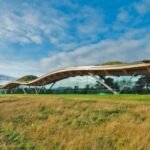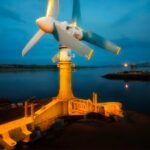Offshore Energies UK, the leading representative body for the UK offshore energy industry, held its annual Health Safety and Environment (HSE) conference on Thursday, 8th February 2024, at the P&J Live centre in Aberdeen. The event attracted over 300 delegates from various sectors and organisations, who came to learn and share best practices on how to tackle the challenges and opportunities of the energy transition and net zero.
Collaboration for climate and environmental goals
One of the key messages of the conference was the need for collaboration across the industry and beyond to achieve the climate and environmental goals and create more high value jobs. David Whitehouse, the chief executive of Offshore Energies UK, said in his presentation that the UK has a unique opportunity to lead the world in the homegrown energy transition and net zero, but it requires a collective effort and a shared vision.
He highlighted some of the initiatives and projects that Offshore Energies UK is involved in, such as the Energy Transition Alliance, the Offshore Renewable Energy Catapult, the Net Zero Technology Centre, and the Offshore Wind Growth Partnership. He also urged the delegates to engage with the government and regulators to shape the policies and regulations that will enable the industry to thrive and innovate.
Preserving and enhancing marine environment
Another focus of the conference was the marine environment and how the industry can preserve and enhance it while developing offshore energy resources. One of the speakers was Dr. James Cook, a marine biologist and the founder of Reefolution, a social enterprise that creates artificial reefs to restore marine ecosystems and sequester carbon.
Dr. Cook explained how his company uses 3D printing and recycled materials to design and deploy custom-made reef structures that mimic natural coral reefs and attract marine life. He also shared some of the results and benefits of his projects, such as increased biodiversity, improved fish stocks, reduced coastal erosion, and enhanced tourism and education opportunities.

He proposed that the offshore energy industry could collaborate with Reefolution to install artificial reefs around their installations, such as oil and gas platforms or wind turbines, to create a win-win situation for both the environment and the industry. He said that this would not only help to offset the carbon footprint and environmental impact of the industry, but also create new revenue streams and social value.
Circular economy and materials management
The conference also addressed the topic of circular economy and materials management, especially in relation to the decommissioning of offshore energy assets. Zero Waste Scotland, a government-funded organisation that supports the transition to a circular economy, presented its proposals for creating materials management facilities that would recycle and reuse the materials from decommissioned oil and gas platforms or wind turbines.
The organisation said that these facilities would not only reduce the waste and emissions associated with decommissioning, but also provide skills, employment, and business opportunities for the local communities and supply chain. It also said that these facilities would support the development of new industries and products that could use the recycled materials, such as construction, manufacturing, or green hydrogen.
Zero Waste Scotland invited the delegates to join its network of circular economy pioneers and partners, and to explore the potential of these facilities for their own organisations and projects.
Net zero stadium and stress management
The conference also featured some presentations from other sectors and disciplines that showcased how they are embracing the net zero message and addressing the health and safety challenges of their work. One of them was Aberdeen Football Club, which gave a tour of its new net zero stadium, which is expected to be completed by 2025.
The stadium, which will have a capacity of 20,000 spectators, will be powered by renewable energy sources, such as solar panels, wind turbines, and battery storage. It will also have a range of energy-efficient and low-carbon features, such as natural ventilation, rainwater harvesting, LED lighting, and electric vehicle charging points. The club said that the stadium will not only reduce its environmental impact and operational costs, but also enhance the fan experience and the community engagement.
Another presentation was by Dr. Sarah Jones, a psychologist and a former contestant of a reality TV show, who shared some lessons on stress management and mental health. She said that participating in the show, which involved living in a remote island with limited resources and competing with other contestants, was one of the most stressful and challenging experiences of her life. She said that she learned some valuable skills and strategies to cope with stress, such as mindfulness, resilience, communication, and teamwork.
She said that these skills and strategies are also applicable to the offshore energy industry, which is often exposed to high levels of stress and pressure. She advised the delegates to practice self-care, seek support, and embrace change as ways to improve their mental health and well-being.
A game-changing event
The OEUK HSE conference was a game-changing event that brought together experts and practitioners from different fields and sectors to share and learn from each other. The conference covered a wide range of topics and issues that are relevant and important for the offshore energy industry and its stakeholders. The conference also showcased some of the innovative and inspiring solutions and projects that are being developed and implemented to address the challenges and opportunities of the energy transition and net zero.
The conference was sponsored by TotalEnergies, CNOOC, and Harbour Energy, and supported by P&J Live, the Aberdeen Exhibition and Conference Centre. The conference was also live-streamed and recorded for those who could not attend in person.


















